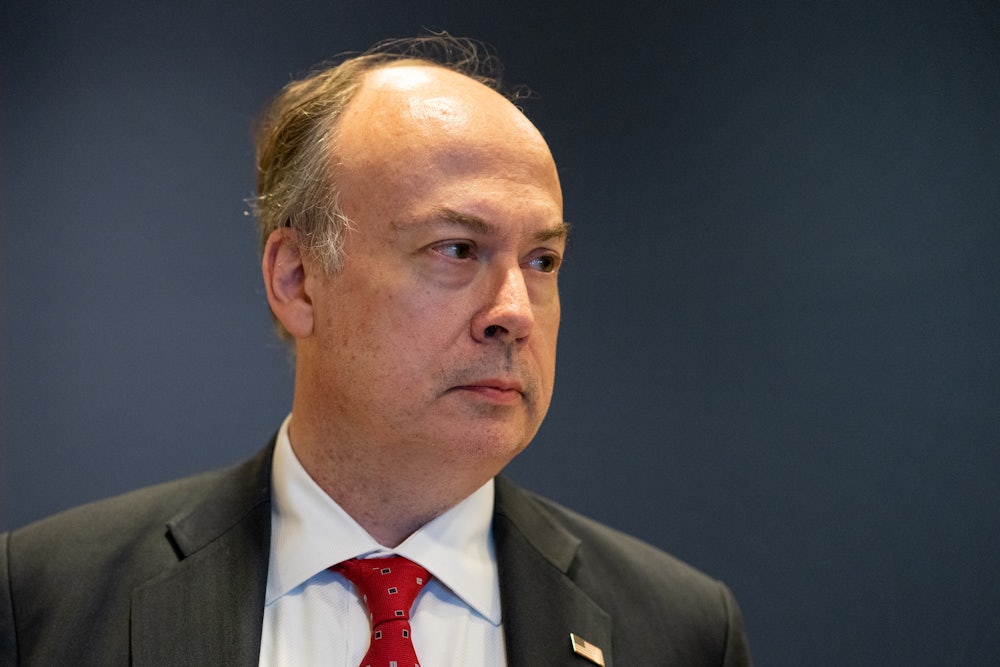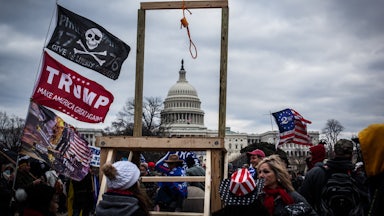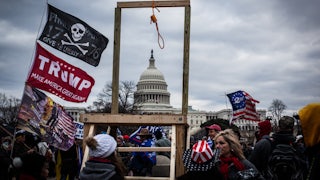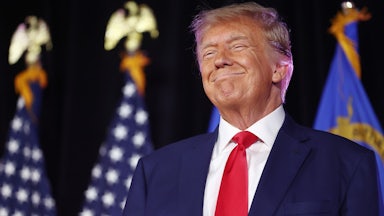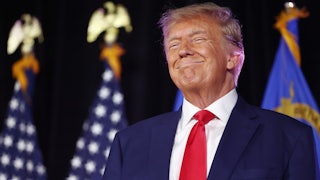The most important selection of text from Tuesday’s indictment against former President Donald Trump isn’t the list of charges against him. It’s not the detailed description of how he and his co-conspirators pressured state lawmakers to overturn the results and compiled lists of fake electors to substitute for lawful ones. Rather, it’s a simple conversation between two Trump administration lawyers three days before January 6.
One of them was Patrick Philbin, the deputy White House counsel. He had a brief glimmer of public prominence when he was part of Trump’s defense team during his first impeachment trial. The other was Jeffrey Clark, the head of the Justice Department’s Civil Division, identified as “Co-Conspirator 4” in the indictment. Clark had embraced Trump’s fraud claims and was, with Trump’s help, poised to become the acting attorney general—the better to further the plot to overturn the election.
Philbin, by contrast, had his feet planted in reality. He knew that the election was over and that Biden had legitimately won it. “The previous month, the Deputy White House Counsel had informed [Trump] that ‘there is no world, there is no option in which you do not leave the White House on January 20,’” the indictment recounted. “Now, the same Deputy White House Counsel tried to dissuade [Clark] from assuming the role of Acting Attorney General.”
But Clark, apparently, would not turn back from the path on which he and his co-conspirators were set. He responded to Philbin by raising the specter of a much darker outcome. “[Philbin] reiterated to [Clark] that there had not been outcome-determinative fraud in the election and that if [Trump] remained in office nonetheless, there would be ‘riots in every major city in the United States,’” the indictment said. “[Clark] responded, ‘Well, [Patrick], that’s why there’s an Insurrection Act.” In short, Trump and his co-conspirators sought to illegally disrupt the transfer of power on January 6 and then use the military to crush what would have been massive nationwide protests while Trump stayed in office.
It is unsurprising that this has not deterred Trump’s most fervent supporters. Indeed, it may even be their preferred outcome. But the indictment should also be the death knell for whatever is left of anti-anti-Trumpism, the bizarre ideological stance held by some establishment conservatives. Yes, it’s bad that Trump keeps doing all these bad things, they often argue, but it would be even worse if he were held accountable for them.
Trumpworld has already rolled out a series of purported defenses against this indictment. You can’t prosecute him because this was all free speech! This is all a distraction from the House GOP’s Hunter Biden investigation! It’s double jeopardy because the Senate acquitted him during his second impeachment trial! None of these are particularly credible, and I won’t waste your time with them.
The anti-anti-Trumpists are at least slightly more sophisticated. Hugh Hewitt, a conservative radio host, led the charge on Tuesday night. “Jack Smith, an American Javert, should be obliged to prosecute this case outside of the Beltway,” he wrote on Twitter, referring to the special counsel who brought the charges. “Former President Trump deserves a fair trial on these unprecedented charges, which will strike tens of millions of Americans as a political witch hunt.”
The implication that Trump cannot get a fair trial in Washington is an old one. One of its earliest permutations came from Alan Dershowitz, who argued all the way back in 2017, during the Russia investigation, that a D.C. jury pool would be hostile to Trump because of the city’s large Black population. Most variants of this now refer to the city’s large Democratic population instead. This gives short shrift to the integrity of jurors themselves and to the voir dire process that Trump’s legal team can use to weed out biased jurors. It is also hardly the fault of prosecutors that Trump tried to carry out his coup attempt in D.C. instead of a more favorable jurisdiction.
Other anti-anti-Trumpists homed in on a supposed weakness in proving Trump’s intent. “Good luck proving that Trump knew he lost the election, when he—whether behind closed doors or in public, whether with one person or massive crowds—has consistently maintained that he won with an apparent passionate sincerity,” National Review editor Rich Lowry wrote on Twitter. He then hastily added: “Of course, this isn’t a good thing. It’s just a fact.” Uh huh.
Prosecutors appear to have anticipated that this unique brand of logic would be deployed, which is why they included an exchange between Trump and Pence in the indictment where Pence demurs on throwing out electoral votes and Trump tells him, “You’re too honest.” I also look forward to seeing Trump’s lawyers argue that he is so utterly detached from reality that he can’t be prosecuted for trying to overthrow the republic.
Belief is not fact. If you still believe your election victory was stolen after your running mate, attorney general, director of national intelligence, and campaign manager have told you it wasn’t and after multiple federal agencies and Republican state lawmakers have disproven your allegations, it’s only because you want to believe it. If I steal Rich Lowry’s car because I steadfastly and implacably believe it’s mine despite all evidence to the contrary, I have still committed grand theft auto.
Andrew McCarthy, a National Review columnist and a former federal prosecutor, was also dismissive of the indictment. He complained in a column on Tuesday night that prosecuting Trump on these charges would be deeply wrong. On the obstruction charge, for example, McCarthy argued that “Americans, presidents included, have a right to attempt to influence Congress, even based on dubious or imagined evidence.”
“To establish obstruction, Smith must prove that Trump’s efforts at persuasion were corrupt—again, in the sense that he knew his badgering and lobbying had no factual or legal merit,” he continued. “The concept of corruption is meant to reach clearly criminal conduct, such as evidence manipulation or witness tampering. It has never been understood to reach wrong-headed legal theories.”
For one thing, I find it hard to imagine a more corrupt act than a president illegally seizing power and holding it through force after losing an election. For another, the badgering and lobbying had no “factual or legal merit” whatsoever. The indictment spends no small amount of time pointing out that everyone except the co-conspirators was telling Trump he was wrong and there was no evidence to support his claims. Most importantly, “the vice president can unilaterally decide who wins a presidential election” is also not a “wrong-headed legal theory.” Qualified immunity is a wrongheaded legal theory. The major-questions doctrine is a wrongheaded legal theory. This was a coup attempt, and Eastman’s memo was merely a thin veneer of legalese to justify it.
For what it’s worth, this is also not what McCarthy argued in the immediate aftermath of January 6. In his January 17 column on the impeachment process, he argued that Trump’s “attempt to influence” lawmakers was an impeachable offense. “It was perfectly appropriate for the president to rely on his legal right to seek recounts and contest state election procedures,” McCarthy wrote. “It is inexcusable, however, for the president to have tried to induce the vice president and congressional Republicans to violate their sworn constitutional duties. That in itself is worthy of an impeachment article.”
What was impeachable conduct two years ago is now, in McCarthy’s eyes, a basic right. It’s worth reading that January 17 column to see how far the anti-anti-Trumpism train has traveled in the last two years. At the time, McCarthy broke ranks with his fellow National Review writers and argued that the “best thing for the country” would be a “bicameral, bipartisan resolution of censure” against Trump that would “stand as an emphatic verdict of history.” He lambasted the Democratic impeachment push for various reasons and said he would vote to convict, if he were a senator, only with apparently great reluctance.
His second line of attack in this week’s column—that federal prosecutors are stretching the defrauding-the-United-States statute—is also tenuous at best. “As the Supreme Court reaffirmed just a few weeks ago, fraud in federal criminal law is a scheme to swindle victims out of money or tangible property,” McCarthy continued. “Mendacious rhetoric in seeking to retain political office is damnable—and, again, impeachable—but it’s not criminal fraud, although that is what Smith has charged.”
This is just not true as a matter of law. McCarthy is correct that the Supreme Court has recently tightened federal anti-corruption laws in some respects, most notably in the McDonnell, Percoco, and Ciminelli cases. But as other commentators have noted, those cases involved the federal bribery and wire-fraud statutes, not the conspiracy-to-defraud statute. And the Supreme Court’s precedents are consistent and clear that obstructing a lawful government function by deceit falls within that specific statute.
And McCarthy’s final point is almost laughable. “Finally, Smith is charging Trump with a civil-rights violation, on the theory that he sought to counteract the votes of Americans in contested states and based on a post–Civil War statute designed to punish violent intimidation and forcible attacks against blacks attempting to exercise their right to vote,” he noted. “What Trump did, though reprehensible, bears no relation to what the statute covers.” He is referring to the Civil Rights Act of 1866, a Reconstruction-era statute that was indeed passed to protect Black Southerners from white supremacist terrorism.
That statute makes it a crime to “conspire to injure, oppress, threaten, or intimidate any person ... in the free exercise or enjoyment of any right or privilege secured to him by the Constitution or laws of the United States.” (In this case, voting rights.) While the Civil Rights Act of 1866 was originally drafted as part of Reconstruction, its language is not limited to those circumstances. That is how laws typically work. McCarthy also surely knows that Reconstruction-era laws can be used in the present day because he is undoubtedly aware of Section 1983, the flagship federal civil rights tort against state and local officials.
That brings us back to the basic irrefutable point: This was a coup attempt. Trump was not merely working out some frustration or trying to gin up some campaign contributions out of his outraged supporters. He was trying to overthrow the republic, to smash two and a half centuries of American self-government because he could not personally stand it that he lost a presidential election and all the privileges that came with it. Naturally, Trump should receive the same due process and legal rights as everyone else in a court of law. But no one is obligated to take his defenders’ claims seriously unless they reckon with that basic fact.
Unfortunately, that reckoning does not seem imminent. “The indictment is a scandal that shows Joe Biden has no business being president,” Dan McLaughlin, another National Review columnist, wrote on Twitter on Tuesday night, adding, “The facts recited in the indictment are a scandal that shows Donald Trump has no business being president.” That is a more fitting epitaph for anti-anti-Trumpism than I could ever compose myself.
